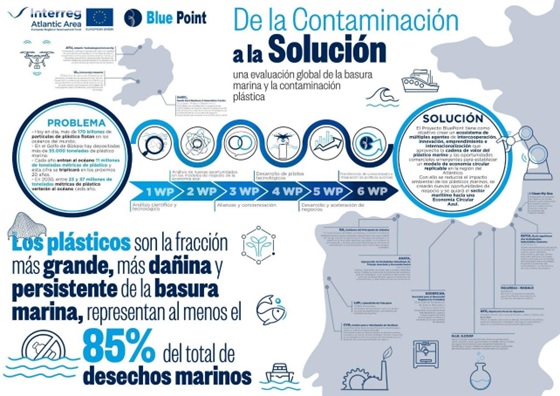BluePoint - Blue Circular Economy of Marine Plastics
Project
BluePoint – Blue Circular Economy of marine plastics
Goals
The BluePoint project aims to take the presence of marine plastic pollution as an opportunity. The objective is to create an ecosystem of inter-cooperation, innovation, entrepreneurship and internationalisation that takes advantage of the different phases of the marine plastic value chain: (1) identification, (2) collection, (3) cleaning and (4) separation and subsequent (5) recycling; and the emerging business opportunities to establish a replicable circular economy model in the Atlantic region.
In turn, the BluePoint project aims to create an ecosystem that involves different social groups, public agents, companies and regions working together to generate new ideas, start businesses and work on innovative solutions to maximise the value of marine plastic.
Expected results:
- Creation of a multidisciplinary multi-stakeholder ecosystem including cooperation, innovation, entrepreneurship and internationalisation, taking advantage of the marine plastic value chain.
- Development of new strategies for the valorisation of marine plastics.
- Promotion of research and technological development with a market-oriented approach, including the development of new technologies to recover, recycle and reuse collected marine plastics.
- Implementation of technical pilots focusing on different stages of the marine plastics value chain, from identification and collection to transformation into new materials.
- Business lead generation: BluePoint is expected to create new business opportunities and accelerate more than 25 companies, leading the maritime sector towards a Blue Circular Economy.
- Participation and awareness raising involving all actors in the marine plastic chain, including ports, fishermen, citizen groups and end-users in a new ecosystem of innovation and inter-cooperation.
- Knowledge transfer and replicability: BluePoint will seek to systematise the developed model so that it can be replicated in other regions and contribute to the transition of the maritime sector towards a resource-efficient circular economy.

Companies Involved


